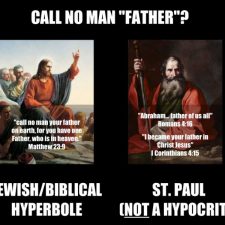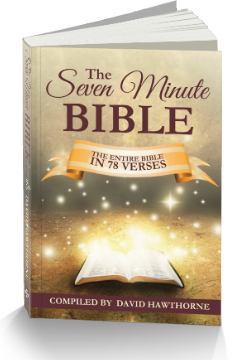In my one-year Bible reading plan, I am coming to the end of 1 Chronicles. David is publically giving the throne to Solomon and giving him and the people instructions. Among these are provisions for the Temple Solomon will build.
In chapter 28, there is an interesting phrase, “David gave all unto Solomon in the Lord’s hand, according unto the understanding given him of the work of the pattern.” (1 Chron. 28:19, Asser LXX)
Brenton’s Septuagint reads similarly, and more explicitly, “David gave all to Solomon in the Lord’s handwriting, according to the knowledge given him of the work of the pattern.”
The KJV, translating… Continue reading
“For the man in Christ, the antinomies of the mind are not irreconcilable opposites; they are simply ruptures caused by the upheaval of original sin in man.
Uniting himself to Christ, man feels in himself a coming-together of fragmented parts, a healing of the intellect, a wholeness and integration that make him capable of integrated understanding.”
-from The Theory of Knowledge According to St. Isaac the Syrian
St. Isaac’s gnoseology held that there were three degrees of knowledge in ascending order of importance.
The First Degree ranges from our animal appetites up to our rational skills in the arts and sciences and is concerned solely… Continue reading
In reading Darwin’s Autobiography and his other writings, public and personal, I think a good summary of the evolution of Charles Darwin’s metaphysical/ religious views would be as follows:
Up to 1830- His seminary days he was a Biblical literalist and a big fan of Paley’s arguments. He says in his Autobiography that at this time, “I did not then in the least doubt the strict and literal truth of every word in the Bible.” During his seminary years he developed a love for science and became an Old Earth Creationist.
1831-1836: His Christian faith was “quite orthodox” in his own words when he boarded… Continue reading
Had a fundamentalist attack me this morning because I did not follow biblical principles when reading the Bible. When I asked him what those principles were he said he did not have a list he just “knew it when he saw it.”
So it got me to thinking, “What ARE my general principles when reading the Bible?” So this morning over coffee I put together a list of ten principles I have learned from the ancient Christians as to how to read the Bible properly.
When reading ancient texts it is best to read them as ancient people wrote and understood them and not in… Continue reading
One very common objection to the Orthodox Catholic Faith is that we refer to our priests as “Father”. And at first glance it seems that those who criticize us for this practice have a case from the Bible. When this charge is brought up our interlocutors have in mind the words of Christ in Matthew 23:8-10, “But you are not to be called rabbi, for you have one teacher, and you are all brethren. And call no man your father on earth, for you have one Father, who is in heaven. Neither be called masters, for you have one master, the Christ.”
Seems clear cut… Continue reading
Here are a few reasons I believe naturalism undermines rationality and ends up being self-defeating under the claim that the natural world/matter is all there is:
To begin with, naturalism/materialism is one of the most primitive philosophies there is and was popular with the pre-Socratic philosophers until refuted by Socrates, Plato and Aristotle. It has only gained resurgence to the extent modern people have forgotten these great philosophers and their clear thinking on this issue.
The idea of the materialist is that matter is all there is and the universe is causally closed. Everything is to be explained solely in terms of physics, matter and… Continue reading
A verse from today’s Gospel, Luke 17:6, “So the Lord said, “If you have faith as a mustard seed, you can say to this mulberry tree, ‘Be pulled up by the roots and be planted in the sea,’ and it would obey you.”
A mustard seed is symbolic of the type of faith we need because although it begins very small it is also very tenacious and can grow in very difficult circumstances. Blessed Augustine writes, “A mustard seed looks small. Nothing is less noteworthy to the sight, but nothing is stronger to the taste. What does that signify but the very great fervor and… Continue reading
Read Ralph Waldo Emerson’s essay on self-reliance and this quote from Zoroaster jumped out at me. A variation of the “God helps those who help themselves” theme: “To the persevering mortal, the blessed Immortals are swift.”
Which in turn reminded me of a Hindu story Joseph Campbell told in Myths to Live By,
“There is a fable told in India of the god Vishnu, supporter of the universe, who one day abruptly summoned Garuda, his air-vehicle, the golden-feathered sunbird; and when his wife, the goddess Lakshmi, asked why, he replied that he had just noticed that one of his worshipers was in trouble. However, hardly… Continue reading
Last night I began reading the prophet Habakkuk. A short book containing only three chapters it is unique in many way among the prophets in that it is primarily a theodicy. That is, it is a prophecy about the impending fall of Judah and Jerusalem and also the ultimate fall of the Babylonians at the hands of the Persians but the main thrust of the book is about how confusing God’s ways can be, how distant He can seem in our trials, how unexpected and even alarming some of His solutions to our problems or answers to our prayers can be.
The prophecy focuses on… Continue reading
“Great indeed, we confess, is the mystery of our religion: He was manifested in the flesh, vindicated in the Spirit, seen by angels, preached among the nations, believed on in the world, taken up in glory.” (1 Timothy 3:16, RSV)
“Without a doubt, great is the mystery of godliness: God was revealed in the flesh, vindicated in [the] spirit, seen by angels, preached among the nations, believed on in the world, and received up in glory.” (1 Timothy 3:16, Eastern Orthodox Bible)
This verse comes up quite often in discussions with King James Only advocates as a… Continue reading
Started 2 Peter for my morning NT reading time. 2 Peter is one of the last books of the NT to be accepted universally by Christians and one of the most hotly debated in terms of authorship among Christians since ancient times.
It did not receive universal acceptance until the late fourth century at the councils of Carthage and Laodicea.
One of my favorite sections speaks of the ancient Christian and orthodox doctrine of theosis or divinization and follows this up with a list of virtues called in ancient rhetoric a sorites or gradation which is itself embedded in the exordium of the whole passage.… Continue reading
Bible factoid: Reading the Gospel of Luke earlier and came across Jesus calling the Pharisees “unmarked graves” in 11:44, “”Woe to you, because you are like unmarked graves, which people walk over without knowing it.” (NIV2011).
Which reminded me of when the Lord called them “whitewashed” or marked tombs in Matthew 23:37, “”Woe to you, teachers of the law and Pharisees, you hypocrites! You are like whitewashed tombs, which look beautiful on the outside but on the inside are full of the bones of the dead and everything unclean.” (NIV2011)
It strikes me that the cut of the insult is even deeper in Luke than… Continue reading
Interesting Bible Factoid. My evening readings are from the OT and I am currently in Ezekiel. This weekend I was in chapter 26, the prophecy about Tyre, and came across Nebuchadnezzar’s name as “Nebuchadrezzar”.
The KJV and a few other translations have Nebuchadrezzar which is more in line with the Hebrew but most translations just put Nebuchadnezzar so it matches the usual form of the name throughout the Bible.
That is unfortunate since the Hebrew intends a play on words here.
Apparently Nebuchadrezzar is the proper form of the name and means, “May Nabu protect the eldest son/ heir” (Nabu was the important Assyro-Babylonian god… Continue reading
For those Christians posting articles and videos about “what the Bible really says” about homosexuality and saying traditional Christians are misled by “poor translations”:
How is it that for three thousand years these interpretations were never taught by the Jews or the Greek Church fathers for whom the Biblical languages were their native tongues and for whom the Biblical cultures were their native cultures only to be discovered by progressive professors in the modern post-Enlightenment, post-Christian West during the sexual revolution of the 1960s?
Do you honestly believe that for three thousand years, no rabbi, no Jewish theological school, no saint, no Fathers, no Doctors… Continue reading
I came across this objection to the type of God atheists think God is from their reading of the Bible recently: “I think trying to define Yahweh as good is like trying to define Aphrodite as Maximally Beautiful and then discovering that all the descriptions are of a woman who is universally unattractive.”
This reminded me of something Richard Dawkins is famous for writing in The God Delusion, “The God of the Old Testament is arguably the most unpleasant character in all fiction: jealous and proud of it; a petty, unjust, unforgiving control-freak; a vindictive, bloodthirsty ethnic cleanser; a misogynistic, homophobic, racist, infanticidal, genocidal,… Continue reading
















